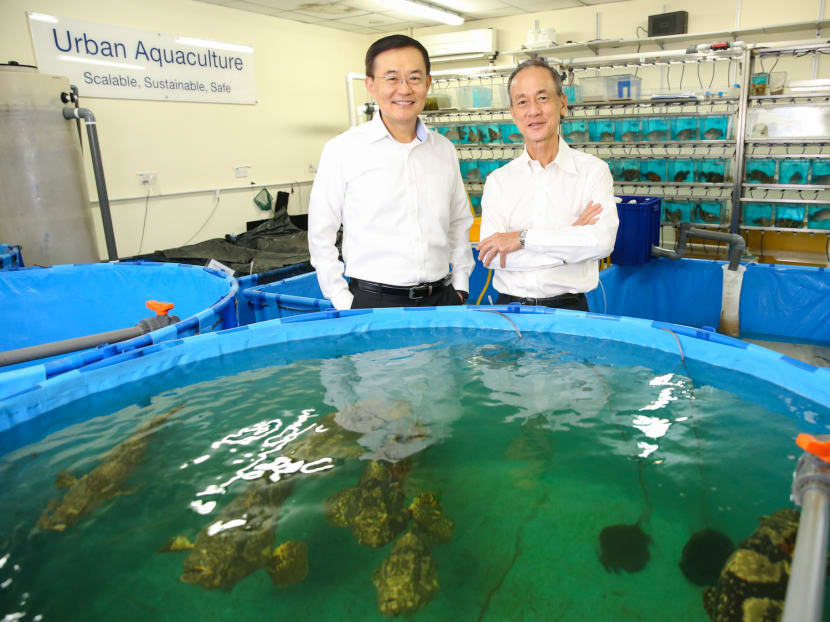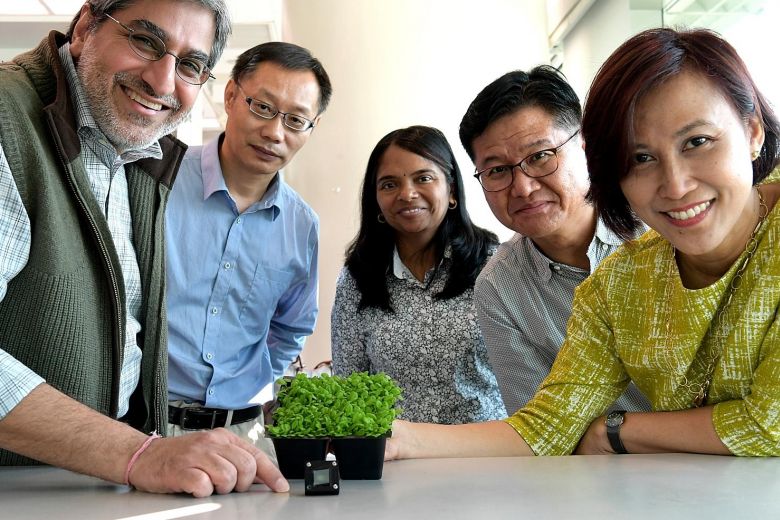

Welcome to our 20th Anniversary microsite! Established in 2002, Temasek Life Sciences Laboratory (TLL) focuses primarily on understanding the cellular mechanisms that underlie the development and physiology of plants, fungi and animals.
With over 200 researchers from more than 20 different nationalities, TLL strives to build a preeminent organization of global talent to undertake cutting-edge, bio-molecular science research and applications to benefit people in Asia and beyond.
TLL began in 2002 and is now 20 years old. Its founding was a reflection of the faith and confidence of those few who were involved at the time, in the critical value and immense potential of life sciences to our lives and to the world we as human beings all have to live in.
This was a time before green terms like “Sustainability” and “Nature-based solutions” became buzz words today. Through the last two decades, TLL has persevered, overcoming many challenges to stay on course and to stay true to its mission of harnessing the power of life sciences with discoveries that positively impact lives and societies.


It is a world that has become much more complex than ever before, faced with rapidly growing global challenges, critical and urgent. I think the best bet for success in such a world is greater synergistic collaboration which can bridge and tap holistically the value of diversity of research in different knowledge fields, as well as that of the world of operating industry and day-to-day practitioners.
Scientists and researchers including all in TLL have their work cut out for them, for much remains to be done and need to be done. I was reminded recently that someone had once said, “one thing I have learned in a long life: that all our science, measured against reality, is primitive and childlike – and yet it is the most precious thing we have.”
That someone was Albert Einstein. Indeed, many believe that looking to nature is a good way to go, for it remains the most fertile source for crucial discoveries, and inspired sustainable solutions to come.
I wish to thank all TLL staff and scientists, past and present, for their dedication and for having travelled faithfully the TLL journey together. I know that I speak for my fellow board members when I say that we look forward to working with all of you to make TLL a great place to work, to undertake the kind of research that will impact the lives of all for the better.
TLL was started in 2002 to become a research institution with a focus to understand and harness the power of life sciences, addressing anticipated challenges in food security, environmental sustainability and well-being — 21st century challenges that directly impact societal needs.
Our first founding decade saw TLL making discoveries, with science as the mission, to deepen our collective understanding of the mysteries underlying cell biology, development and diseases, and how these could impact the many facets of human life.
The foundations set up by TLL’s basic science form the basis of our strategic research purpose, with science as the means, to provide us with unique opportunities, and with that, great responsibility, to keep a laser-sharp focus on bringing discoveries to deliveries and to build an innovation ecosystem to impact lives of Singaporeans, as well as people in Asia and beyond.
20 years on, the quality of science which our discoveries rests upon have garnered stronger partnerships with our local research ecosystem as well as lasting industry collaborations. For this, I would like to thank TLL’s key partners from private, public and people sectors, especially Temasek Trust, Temasek Foundation, National Research Foundation and other agencies, for their unwavering support.


I would like to take this opportunity to welcome Mr Benny Lim as our Chairman from January 2023, having taken over from Dr Teo Ming Kian, who has guided us with steady hands from 2012. I look forward to working closely with Benny, and all our current Board members to further our mission, and help bring TLL to greater heights.
I would also like to thank all previous Board members for their guidance and to all existing and ex-TLL scientists, administration and support personnel for their dedication, hard work and commitment to our cause.
To those with a million dreams who gravitate towards solving an important problem, know that there’s a world waiting for you at TLL. Our future is made possible when our purpose attracts knowledge seekers and truth finders, people who are energised to furthering bold, original and impactful research to improves lives.
Much remains to be done. Together, we can work with partners and stakeholders to continue bringing life sciences to life, and to invent, innovate and invest in creating a better world.
1 Research Link
National University of Singapore
Singapore 117604
Welcome to our 20th Anniversary microsite! Established in 2002, Temasek Life Sciences Laboratory (TLL) focuses primarily on understanding the cellular mechanisms that underlie the development and physiology of plants, fungi and animals.
With over 200 researchers from more than 20 different nationalities, TLL strives to build a preeminent organization of global talent to undertake cutting-edge, bio-molecular science research and applications to benefit people in Asia and beyond.
TLL began in 2002 and is now 20 years old. Its founding was a reflection of the faith and confidence of those few who were involved at the time, in the critical value and immense potential of life sciences to our lives and to the world we as human beings all have to live in.
This was a time before green terms like “Sustainability” and “Nature-based solutions” became buzz words today. Through the last two decades, TLL has persevered, overcoming many challenges to stay on course and to stay true to its mission of harnessing the power of life sciences with discoveries that positively impact lives and societies.


It is a world that has become much more complex than ever before, faced with rapidly growing global challenges, critical and urgent. I think the best bet for success in such a world is greater synergistic collaboration which can bridge and tap holistically the value of diversity of research in different knowledge fields, as well as that of the world of operating industry and day-to-day practitioners.
Scientists and researchers including all in TLL have their work cut out for them, for much remains to be done and need to be done. I was reminded recently that someone had once said, “one thing I have learned in a long life: that all our science, measured against reality, is primitive and childlike – and yet it is the most precious thing we have.”
That someone was Albert Einstein. Indeed, many believe that looking to nature is a good way to go, for it remains the most fertile source for crucial discoveries, and inspired sustainable solutions to come.
I wish to thank all TLL staff and scientists, past and present, for their dedication and for having travelled faithfully the TLL journey together. I know that I speak for my fellow board members when I say that we look forward to working with all of you to make TLL a great place to work, to undertake the kind of research that will impact the lives of all for the better.
TLL was started in 2002 to become a research institution with a focus to understand and harness the power of life sciences, addressing anticipated challenges in food security, environmental sustainability and well-being — 21st century challenges that directly impact societal needs.
Our first founding decade saw TLL making discoveries, with science as the mission, to deepen our collective understanding of the mysteries underlying cell biology, development and diseases, and how these could impact the many facets of human life.
The foundations set up by TLL’s basic science form the basis of our strategic research purpose, with science as the means, to provide us with unique opportunities, and with that, great responsibility, to keep a laser-sharp focus on bringing discoveries to deliveries and to build an innovation ecosystem to impact lives of Singaporeans, as well as people in Asia and beyond.
20 years on, the quality of science which our discoveries rests upon have garnered stronger partnerships with our local research ecosystem as well as lasting industry collaborations. For this, I would like to thank TLL’s key partners from private, public and people sectors, especially Temasek Trust, Temasek Foundation, National Research Foundation and other agencies, for their unwavering support.


I would like to take this opportunity to welcome Mr Benny Lim as our Chairman from January 2023, having taken over from Dr Teo Ming Kian, who has guided us with steady hands from 2012. I look forward to working closely with Benny, and all our current Board members to further our mission, and help bring TLL to greater heights.
I would also like to thank all previous Board members for their guidance and to all existing and ex-TLL scientists, administration and support personnel for their dedication, hard work and commitment to our cause.
To those with a million dreams who gravitate towards solving an important problem, know that there’s a world waiting for you at TLL. Our future is made possible when our purpose attracts knowledge seekers and truth finders, people who are energised to furthering bold, original and impactful research to improves lives.
Much remains to be done. Together, we can work with partners and stakeholders to continue bringing life sciences to life, and to invent, innovate and invest in creating a better world.
1 Research Link
National University of Singapore
Singapore 117604
Welcome to our 20th Anniversary microsite! Established in 2002, Temasek Life Sciences Laboratory (TLL) focuses primarily on understanding the cellular mechanisms that underlie the development and physiology of plants, fungi and animals.
With over 200 researchers from more than 20 different nationalities, TLL strives to build a preeminent organization of global talent to undertake cutting-edge, bio-molecular science research and applications to benefit people in Asia and beyond.
TLL began in 2002 and is now 20 years old. Its founding was a reflection of the faith and confidence of those few who were involved at the time, in the critical value and immense potential of life sciences to our lives and to the world we as human beings all have to live in.
This was a time before green terms like “Sustainability” and “Nature-based solutions” became buzz words today. Through the last two decades, TLL has persevered, overcoming many challenges to stay on course and to stay true to its mission of harnessing the power of life sciences with discoveries that positively impact lives and societies.


It is a world that has become much more complex than ever before, faced with rapidly growing global challenges, critical and urgent. I think the best bet for success in such a world is greater synergistic collaboration which can bridge and tap holistically the value of diversity of research in different knowledge fields, as well as that of the world of operating industry and day-to-day practitioners.
Scientists and researchers including all in TLL have their work cut out for them, for much remains to be done and need to be done. I was reminded recently that someone had once said, “one thing I have learned in a long life: that all our science, measured against reality, is primitive and childlike – and yet it is the most precious thing we have.”
That someone was Albert Einstein. Indeed, many believe that looking to nature is a good way to go, for it remains the most fertile source for crucial discoveries, and inspired sustainable solutions to come.
I wish to thank all TLL staff and scientists, past and present, for their dedication and for having travelled faithfully the TLL journey together. I know that I speak for my fellow board members when I say that we look forward to working with all of you to make TLL a great place to work, to undertake the kind of research that will impact the lives of all for the better.
TLL was started in 2002 to become a research institution with a focus to understand and harness the power of life sciences, addressing anticipated challenges in food security, environmental sustainability and well-being — 21st century challenges that directly impact societal needs.
Our first founding decade saw TLL making discoveries, with science as the mission, to deepen our collective understanding of the mysteries underlying cell biology, development and diseases, and how these could impact the many facets of human life.
The foundations set up by TLL’s basic science form the basis of our strategic research purpose, with science as the means, to provide us with unique opportunities, and with that, great responsibility, to keep a laser-sharp focus on bringing discoveries to deliveries and to build an innovation ecosystem to impact lives of Singaporeans, as well as people in Asia and beyond.
20 years on, the quality of science which our discoveries rests upon have garnered stronger partnerships with our local research ecosystem as well as lasting industry collaborations. For this, I would like to thank TLL’s key partners from private, public and people sectors, especially Temasek Trust, Temasek Foundation, National Research Foundation and other agencies, for their unwavering support.


I would like to take this opportunity to welcome Mr Benny Lim as our Chairman from January 2023, having taken over from Dr Teo Ming Kian, who has guided us with steady hands from 2012. I look forward to working closely with Benny, and all our current Board members to further our mission, and help bring TLL to greater heights.
I would also like to thank all previous Board members for their guidance and to all existing and ex-TLL scientists, administration and support personnel for their dedication, hard work and commitment to our cause.
To those with a million dreams who gravitate towards solving an important problem, know that there’s a world waiting for you at TLL. Our future is made possible when our purpose attracts knowledge seekers and truth finders, people who are energised to furthering bold, original and impactful research to improves lives.
Much remains to be done. Together, we can work with partners and stakeholders to continue bringing life sciences to life, and to invent, innovate and invest in creating a better world.
1 Research Link
National University of Singapore
Singapore 117604
TLL hosts Singapore Ministers for Sustainability and the Environment, Social and Family Development, and Health
SFA, NUS, TLL and Industry Partners sign MoU for the AquaPolis programme (video)
Nature Microbiology: Standardized multi-omics of Earth’s microbiomes reveals microbial and metabolite diversity
A VASt-domain protein regulates autophagy, membrane tension, and sterol homeostasis in rice blast fungus (Autophagy)
Pathnova starts clinical trial on Singaporeans for cancer research

Molecular Plant: G protein controls stress readiness by modulating transcriptional and metabolic homeostasis in Arabidopsis thaliana and Marchantia polymorpha.
Covid 19 Pandemic: TLL joins Temasek Foundation in testing non alcoholic hand sanitisers for BYOB Hand Sanitiser Project (video)
TLL spins off Aqualita Ecotechnology (video)
Science: Florigen sequestration in cellular membranes modulates temperature-responsive flowering
Molecular Biology and Evolution: Genomic Basis of Striking Fin Shapes and Colors in the Fighting Fish
Covid-19 Pandemic: TLL joins Temasek Foundation in testing water and hand sanitiser quality, as well as public distribution for BYOB Hand Sanitiser Project
(video)
Louis Dreyfus Company Partners Barramundi Asia and TLL on Aqua Feed Research (video)
Advanced Science: Mesostigma viride Genome and Transcriptome Provide Insights into the Origin and Evolution of Streptophyta
Molecular Cell: Arginine-Enriched Mixed-Charge Domains Provide Cohesion for Nuclear Speckle Condensation
TLL spins off Zero 2.5 (video)
Temasek Rice ready to take on global market after grant of plant varieties protection (video)
TLL files patents for Apparatus and Device for Generating Negative Air Ions from Plants (PCT/SG2019/050130) and Application of A Food Azo Dye, Brilliant Black Bn, on Inhibition of Infectivity of Human Enteroviruses Causing Hand Foot And Mouth Diseases (PCT/SG2019/050130)
Nature Nanotechnology: Chloroplast-selective gene delivery and expression in planta using chitosan-complexed single-walled carbon nanotube carriers
Nucleic Acids Research: Hidden sequence specificity in loading of single-stranded RNAs onto Drosophila Argonautes
TLL spins off Allegro Aqua

TLL commences research on Disruptive, Sustainable Technologies for Agricultural Precision (DiSTAP)

Nature Chemical Biology: Establishment of the PAR-1 cortical gradient by the aPKC-PRBH circuit
Nature Communications: Chromatin-mediated feed-forward auxin biosynthesis in floral meristem determinacy
Nature: Topological defects in epithelia govern cell death and extrusion
Nature: Embryonic epigenetic reprogramming by a pioneer transcription factor in plants
TLL launches Training in Biosafety and Infectious Substances Shipping for Public Health Laboratories in Asia Pacific
Singapore’s Temasek Rice Developed by TLL Scientists for Regional Food Security (video)
Singapore led Consortium Deciphers the Genome of Asian Seabass: First Major Tropical Food Fish with its ‘Genetic Blueprint’ Assembled and Read
Genes & Development: JMJ24 targets CHROMOMETHYLASE3 for proteasomal degradation in Arabidopsis
Nature Communications: Pin1At regulates PIN1 polar localization and root
Molecular Cell: Adaptive Regulation of Testis Gene Expression and Control of Male Fertility by the Drosophila Harpin RNA Pathway
Molecular Cell: Widespread Rearrangement of 3D Chromatin Organization Underlies Polycomb-Mediated Stress-Induced Silencing
TLL and Temasek Foundation build capacities in laboratory bio risk management in Laos, Cambodia, Myanmar, Indonesia and Vietnam
Nature Materials: Epithelial bridges maintain tissue integrity during collective cell migration
Cell: The Histone Variant H2A.W Defines Heterochromatin and Promotes Chromatin Condensation in Arabidopsis
TLL and Temasek Foundation customises rice cultivation programmes with the Indonesian Agency for Agricultural R&D
TLL young scientists Dr Zhang Dan and Dr Dr Guillaume Thibault received Chinese Government Award and Elite Nanyang Assistant Professorship Award for academic excellence
Nitrogen-fixing Bacterial Inoculant for Improvement of Crop Productivity and Reduction of Nitrous Oxide Emission (PCT/SG2013/000112)
Nature Cell Biology: In vitro contraction of cytokinetic ring depends on myosin II but not on actin dynamics
Science: Futile Protein Folding Cycles in the ER Are Terminated by the Unfolded Protein O-Mannosylation Pathway
TLL develops plant and microbial systems for flavours and fragrances with National Research Foundation
TLL sponsors Outstanding Poster Abstract Entries at the ‘Next Generation Technologies for Bioenergy and Biomass Utilization’ International Conference
Cell: Reprogramming of DNA Methylation in Pollen Guides Epigenetic Inheritance via Small RNA
Molecular Cell: The Membrane Stress Response Buffers Lethal Effects of Lipid Disequilibrium by Reprogramming the Protein Homeostasis Network
TLL and AVA receives Grant Award from National Research Foundation on Applied Aquaculture Genomics R&D
TLL receives additional grants from National Research Foundation on Rice Research for Regional Food Security
Molecular Cell: A Complex of Pdi1p and the Mannosidase Htm1p Initiates Clearance of Unfolded Glycoproteins from the Endoplasmic Reticulum
Neuron: Intrinsic Epigenetic Factors Cooperate with the Steroid Hormone Ecdysone to Govern Dendrite Pruning in Drosophila
Developmental Cell: Interplay between the Transcription Factor Zif and aPKC Regulates Neuroblast Polarity and Self-Renewal
Developmental Cell: DELLAs Modulate Jasmonate Signaling via Competitive Binding to JAZs
Regeneration and Mass Propagation of Jatropha curcas Through Somatic Embryogenesis (PCT/SG2009/000015)
Genes and Development: Protein Phosphatase 4 mediates localization of the Miranda complex during Drosophila neuroblast asymmetric divisions
Nature Neuroscience: A genetic pathway composed of Sox14 and Mical governs severing of dendrites during pruning
Wang Hongyan receives Singapore National Young Scientist Medal & National Research Foundation Fellow
TLL files a patent for Monoclonal antibodies specific to hemagglutinin and Neuraminidase from Influenza virus H5-subtype or N1-subtype and Uses thereof (PCT/SG2008/000347)
Nature Cell Biology: Lectins sweet-talk proteins into ERAD
Nature: Mei-P26 regulates microRNAs and cell growth in the Drosophila ovarian stem cell lineage
TLL and the Institute of Botany of Chinese Academy of Science forms joint laboratory on bioenergy crops
Nature: Two distinct modes of guidance signaling during collective migration of border cells
Nature: Polo inhibits progenitor self-renewal and regulates Numb asymmetry by phosphorylating Pon
Cell: Have you HRD? Understanding ERAD Is DOAble!
(read more)
Genes & Development: Aurora-A acts as a tumor suppressor and regulates self-renewal of Drosophila neuroblasts
(read more)
TLL discovers the molecular interaction between a resistance gene in rice and pathogenic bacteria, and its effect on disease resistance in rice
TLL conducts regional biosafety training with the Canadian International Development Agency (CIDA) and Singapore Ministry of Foreign Affairs (MFA)
Nature: R gene expression induced by a type-III effector triggers disease resistance in rice
Science: The Transcriptional Landscape of the Mammalian Genome
TLL and the Institute of Genetics Developmental Biology of Chinese Academy of Science forms joint laboratory on rice functional genomics
Genes and Development: Roles of Bifocal, Homer, and F-actin in anchoring Oskar to the posterior cortex of Drosophila oocytes
Developmental Cell: The S. pombe Cdc14-like Phosphatase Clp1p Regulates Chromosome Biorientation and Interacts with Aurora Kinase
TLL files a patent for Nucleic Acids from Rice Conferring Resistance to Bacterial Blight Disease Casued by Xanthomonas spp (PCT/SG2003/000191)
Current Opinion in Cell Biology: Cytokinesis: relative alignment of the cell division apparatus and the mitotic spindle
Trends in Genetics: Cytokinesis in fission yeast: a story of rings, rafts and walls
Nature: SINAT5 promotes ubiquitin related degradation of NAC1 to attenuate auxin signals
Nature Cell Biology: Astral microtubules monitor metaphase spindle alignment in fission yeast
At TLL, our staff and scientists are committed to putting the magic and potency of science to good use. Our first founding decade saw TLL making discoveries, going beyond the ordinary to deepen our collective understanding of the environment and impacting various facets of human life. With vivid dreams conjuring special things….